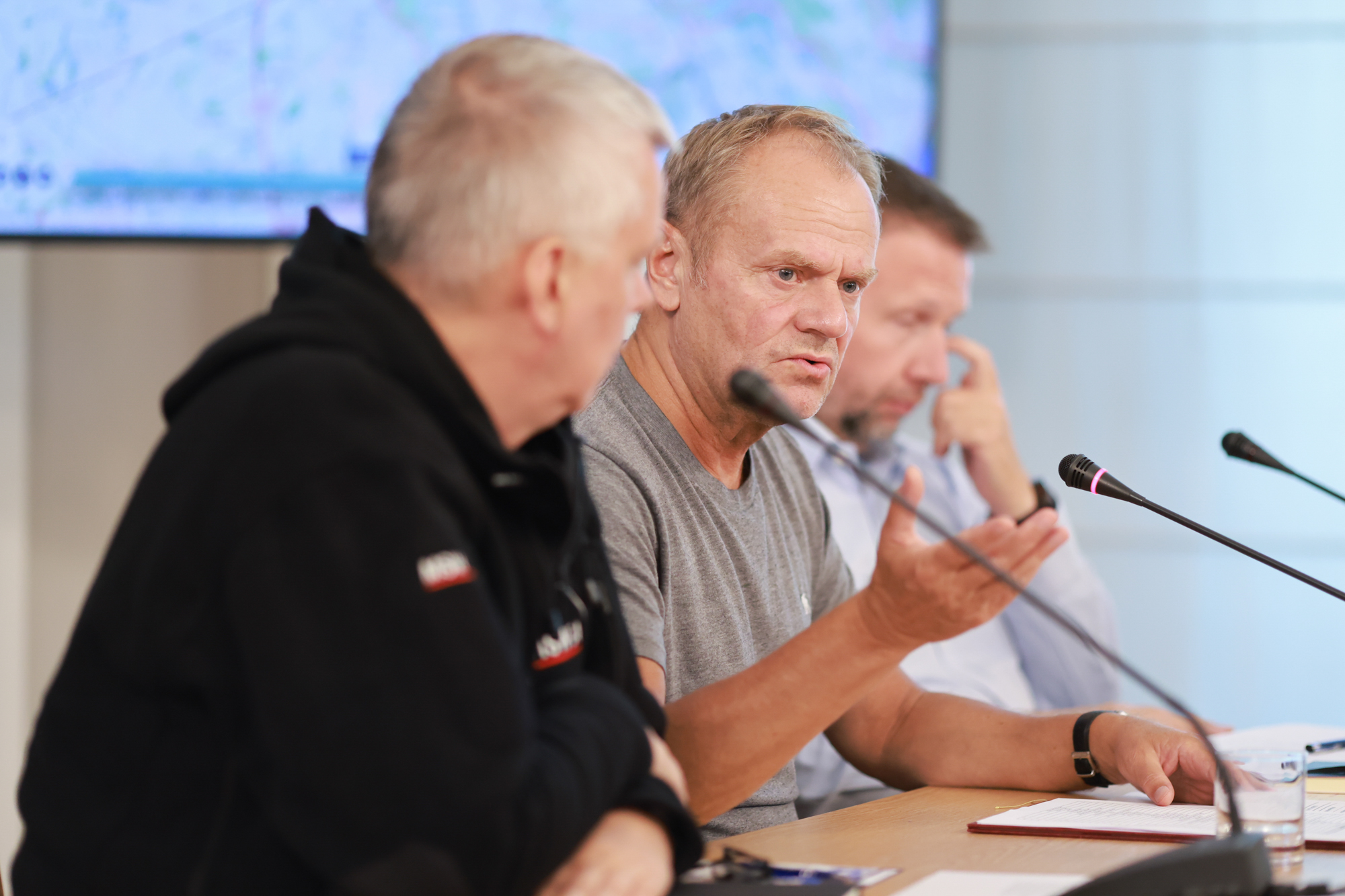Prime Minister: We will spare no expense rebuilding flooded areas
21.09.2024
Prime Minister Donald Tusk attended a meeting with voivodes at the Lower Silesian Voivodeship Office. It was devoted to estimating the preliminary cost of the damage. Voivodes presented data collected from local government bodies. These figures are crucial for the launch of the rebuilding programme. The disaster has shown that new flood control infrastructure is also needed.

Losses caused by the disaster
Estimating the damage is still impossible in some areas due to standing water, which forced voivodes to rely on preliminary estimates of the damage caused by flood.
“This is the first briefing concerning the preliminary lists of losses and damages, which affected the residents, local governments and state institutions in the flooded areas. I want to make it clear that this is a preliminary summary. The disaster response is far from over,”
the Prime Minister said at the start of the meeting with voivodes.
The Director of the Prime Minister’s Office Jan Grabiec presented a summary of the reports prepared by voivodes, indicating that a total of 749 villages, towns and cities are now covered by the state of natural disaster. The total population affected is 2.39 million. The total number of residents directly affected by the flood is 57,000. More than 6,544 people were evacuated.
According to preliminary figures, 11,502 residential buildings - detached houses and apartment buildings - were damaged. 6,033 farm buildings were affected by flooding. 724 public buildings were damaged, including schools, kindergartens and sports facilities.
“In Lower Silesia alone, 54 schools, 10 playgrounds, 39 pitches, 20 crèches and 20 kindergartens have been damaged. And that list is still incomplete,”
Donald Tusk enumerated.
The Minister of the Interior and Administration noted that the voivodes should indicate any priority needs concerning critical infrastructure in their estimates.
“We will do our best to pay out the first instalment as quickly as possible in order to get the bridges cleaned up and operational in various areas,”
said Tomasz Siemioniak, Minister of the Interior and Administration.
He also expressed his understanding that the towns and cities which were particularly affected by the flood had not yet been able to provide preliminary estimates of the damage.
Restoration programme
Local government bodies are working on estimating losses after the waters subsided. This step is needed in order to launch the rebuilding programme in the affected areas.
“We need to develop this great reconstruction plan - this is our commitment and our national ambition. But first, we need to know what has been destroyed and who needs our help first. Only then we can launch this grand programme,”
Donald Tusk stated.
Securing the affected areas, as well as assisting residents who have lost their belongings, remains a major challenge. It will be addressed by the Reconstruction+ scheme.
“I think the Prime Minister has outlined very clearly the task ahead of us all. […] We will have to do our best to restore these areas and get everything back and running as efficiently and as quickly as possible,”
said Marcin Kierwiński during the meeting.
He also thanked the voivodes for the collected data and reports, which will enable the reconstruction to begin.
Investment in post-flood reconstruction
Thanks to state and European funding, it will be possible to help the people affected by the floods and rebuild damaged infrastructure. On Thursday, the President of the European Commission announced that we would be able to use 20 billion PLN for this purpose.
“It is clear to me that if we are spending billions on rebuilding the affected areas, the aftermath needs to be better than the situation before the flood. We are not only talking about security, but also about the damaged infrastructure,”
the Prime Minister noted.
He added that there would be no shortage of funds for rebuilding the affected areas.
Flood control infrastructure
The current situation has shown that expanding and upgrading flood control infrastructure is crucial. It is about adapting the infrastructure to the current meteorological and hydrological conditions.
“The smart, wise and - let’s not beat around the bush - costly decisions concerning reservoirs and other infrastructure will help us . . . lower the risks of this situation repeating in the future. And we will fund everything,”
the Prime Minister noted.
The key is to protect people and their possessions in the future.
Green schools
The Ministry of Education is working on the Green Schools scheme, which will enable children from the affected areas to learn and rest in safe places.
“I hope that tomorrow we will be able to show you a clear map of places where children can go immediately, with full care and board, to continue learning while we are making sure that the necessary repairs are done at their schools,”
the Prime Minister announced.
The Green Schools scheme will ensure that children can continue their education and parents can work on recovering after the disaster. In the meantime, the state will ensure that all schools are rebuilt.
Current flood risk
The Prime Minister announced a visit to Głogów in connection with the ongoing flood risk.
“I want to believe that the city has everything it needs and that it is safe from the flooding,”
the Prime Minister stated.
He added that Głogów was the absolute priority for that day.



